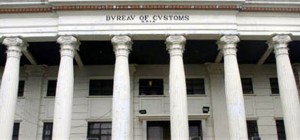BOC concedes 2014, 2015 collections targets unreachable
MANILA, Philippines — The Bureau of Customs (BOC) conceded on Monday that it could not hit its full-year collections goal for 2014 even as revenues during the first 11 months continued to rise double-digits on the back of “major headway made in reducing smuggling.”
BOC Commissioner John Phillip P. Sevilla also pledged to introduce more reforms in 2015 to further shore up revenues while putting a stop to unscrupulous activities of some importers.
Sevilla told a press conference that while the 2014 collections target of P408.1 billion cannot be achieved, the growth of almost a fifth could still be maintained until yearend.
BOC data showed that the January-to-November collections increased by 17.8 percent to P331.2 billion from P281.1 billion in the same 11-month period in 2013. The collections during the first 11 months, however, were 11.9-percent below the target of P376.1 billion for the period.
In the month of November alone, collections amounted to P31.2 billion, up 10.5 percent from the P28.2 billion posted in the same month in 2013. The revenues in November were 16.4-percent less than the target for the month worth P37.3 billion.
Not only this year’s goal but also the P456-billion target for 2015 as earlier determined by the inter-agency, Cabinet-level Development Budget Coordination Committee may prove to be difficult to reach. “The 2015 target is impractical and unrealistic, especially with oil prices down,” Sevilla explained.
Despite the challenges in hitting their collections targets, Sevilla noted that the BOC has been making strides in addressing the problem of smuggling at the country’s ports.
For one, Sevilla said that “I believe we have stopped rice smuggling.” He cited that large-scale rice smuggling has become a thing of the past this year, and the BOC had achieved record amounts in terms of seizures, auctions and the number of cases filed against alleged rice smugglers.
However, the BOC chief said that a couple of ports down south such as those in Zamboanga and the Phividec Industrial Authority have become the new “hotspots” in rice smuggling. “Next year, we will pay more attention to what’s going on at those ports,” he said.
Also, Sevilla said there has been a “significant reduction in the smuggling of fuel”—as importation volumes of crude oil, diesel and gasoline rose by 17 percent, 25 percent and 10 percent, respectively, to date.
“If you ask oil companies, they would not attribute the higher volumes to higher consumption. We are registering higher volumes because those shipments being smuggled before are now going in through legal channels,” Sevilla explained.
Also cited by Sevilla as a BOC’s achievements this year was having “successfully ended” the undervaluation of resin imports.
While Sevilla admitted that the agency has remained quite slow in hiring quality new hires and in resolving cases against allegedly erring personnel, the BOC vowed to further improve the efficiency of import procedures and transactions.
For one, the BOC chief said they would like to clear 90 percent of import entries in as fast as four hours in 2015. “We’re already redesigning our procedures to achieve this target. We will put in place a new electronic processing system,” Sevilla said.
The BOC also plans a “same day” examination of cargoes that shall be flagged as possibly smuggled.
“For this, we had proposed P250 million in our 2015 budget, but the House has slashed it to P100-150 million. This amount will be used to pay for the inspection of shipments we are alerted of. The BOC will now shoulder the cost,” Sevilla explained to reporters.
